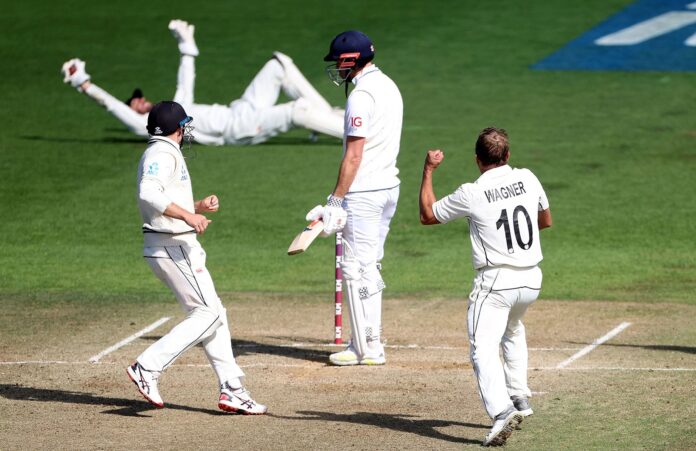Just the second one-run margin in the history of Test cricket, and only the fourth side to win after being asked to follow in, New Zealand triumphed in a classic in Wellington
England became just the fourth team in Test history to lose after enforcing the follow-on, with New Zealand’s Neil Wagner dismissing last man James Anderson to seal an unforgettable one-run win in Wellington.
In a match that is sure to go down as one of the most gripping contests ever seen in the grand old format, it was England who stumbled at the line with Anderson feathering Wagner down the leg-side to leave England 256 all out chasing 258.
In a thrilling Test match, New Zealand defeated England by one run.
The only other one-run victory before this one came in 1993 at Adelaide between the West Indies and Australia, when No. 11 Craig McDermott was the last man out caught behind off Courtney Walsh.
There were parallels in Wellington, when Neil Wagner’s bowling caused James Anderon to be the last man out and be caught by Kiwi wicketkeeper Tom Blundell, who made an incredible grab down the leg side.
Ben Stokes’ team joined the Australian classes of 1894, 1981, and 2001 as the only teams to ever lose after immediately sending the opposition back to bat in an astonishing turn of events.
Stokes made that choice after amassing a 226-run first innings advantage, but he was unable to maintain it as the Black Caps batted brilliantly and successfully to extend the game into day five.
As Stokes and Joe Root put on a 121-run partnership and when Ben Foakes’ calculated 33 brought the chase to within seven runs of victory, England appeared to have the game in hand. But, New Zealand wouldn’t give up and fought valiantly to win the game in the tense conclusion.
When it came to dismissing Stokes and Root in the span of four deliveries, Wagner was a hero. He also displayed steely nerves to get Anderson caught behind when one poor decision could have cost him everything.
He also provided Foakes with a difficult catch just when the Surrey gloveman appeared to be rising above the controversy.
It was the only defeat England have suffered in 12 games while being led by Stokes and head coach Brendon McCullum, and it came in jaw-dropping style, just like almost everything else they have accomplished since taking the helm.
The top order planted the seeds for England’s defeat by contributing several erroneous and careless dismissals, although Foakes and Leach came close to saving them.
When they combined, there were 43 needed, which put the game squarely in New Zealand’s court. But, Foakes excelled in defending the strike and eroding the goal.
Leach was happy to take on the same role he played at Headingley during the 2019 Ashes, when his one not out from 17 balls enabled Stokes to pull off an incredible victory.
Foakes went about things in steadier fashion as he took the required runs into single digits and it was a great shock when he erred, pulling Southee to fine leg.
Everyone present knew the outcome was imminent when Anderson broke the dense atmosphere with a flourishing boundary, leaving one to draw and two to win.
When the ball was thrown in favour of New Zealand, Anderson struggled to get out of the crease. He accepted the fate of England and himself by not even requesting DRS.accepting his fate and that of England as the Black Caps ecstatically rejoiced.
At the conclusion, Leach, who had batted for 71 minutes and 31 deliveries for his lone unbeaten, peered off into the distance. He had just witnessed one of England’s most thrilling victories and one of their most demoralising losses.
Given Stokes’ knee injury and inability to provide more than two overs throughout the game, there will undoubtedly be discussion about the choice to proceed with the game. Although New Zealand’s tenacious second-innings resistance definitely exhausted England’s remaining bowlers, they will still be disappointed with how they failed to end the game on day five.
Moreover, umpire Chris Gaffaney may come under scrutiny after choosing not to rule Wagner out for a wide when he dragged one way down the leg side just before Anderson was dismissed.
A margin call like that wouldn’t have drawn much attention at any other moment in the game, but because the additional run would have tied the game, it might not be as readily forgotten now.
If not for a shoddy first hour that cost them four wickets for 27, England would ponder that things may have been simpler—if less entertaining.
Nightwatchman Ollie Robinson barely lasted three overs, Ben Duckett, the opener, flashed to slip with his feet on concrete, and Ollie Pope, who scored 14, was very unconvincing. The most expensive loss, though, was the absence of Harry Brook, who was in fine form.
At the non-conclusion, striker’s Root left him for dead after tempting him into a reckless single. His unintentional sacrifice was a body blow because he had four century in his last five Test matches, including 186 in the previous innings.
Before following Stokes’ example and falling victim to Wagner’s short-ball strategy, Root made a significant effort to atone for his transgressions. This led to a thrilling conclusion in which England lost at the crucial moment.

































